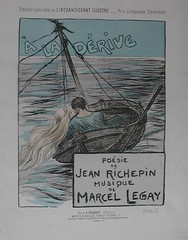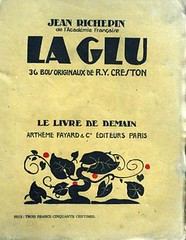Jean Richepin @160
[Youtube=http://www.youtube.com/watch?v=5bAZPmgvQn4&]
contemporary version of La Glu by a certain Dorsannes
Jean Richepin (February 4, 1849 – December 12, 1926), French poet, novelist and dramatist, noted for perpetuating tropes such as La Glu (1881). He belonged to the Le Cercle des poètes Zutiques and was an important player in French cabaret, the French avant-garde, the history of the cruel tale and the history of derision.
Richepin was virtually unknown until the publication, in 1876, of a volume of verse entitled Chanson des gueux (see Les Gueux), when his outspokenness resulted in his being imprisoned and fined for outrage aux mœurs.
La Glu
La Glu first came to my attention[1] a year ago. It is a poem/song by French writer Jean Richepin. It is a story of motherly love, of a mistress who demands of her lover his mother‘s heart to feed to her dog.
The song was a staple in the French cabarets of the late 19th century and has been interpreted by various performers including Eugènie Valladon, Mistinguett and Polaire.
“La Glu” was brought to stage by Richepin for the Théâtre de l’Ambigu-Comique in 1883 and later adapted to musical drama set to music by Gabriel Dupont performed at the opera of Nice in 1910.
Hungarian writer József Kiss used the plot for his novel The Mother’s Heart (“Az anyasziv”, written between 1883 and 1889).
The origin of the story is probably an old Arabian tale. It was updated in the 1920s by Iranian poet Iraj Mirza.
The original lyrics of “La Glu” are:
- Y avait une fois un pauvre gars
- Et lonlon laire
- Et lonlon la
- Y avait une fois un pauvre gars
- Qui aimait celle qui ne l’aimait pas.
- T’es-tu fait mal, mon enfant ?
- Et le cœur disait, en pleurant :
- Elle lui dit : Apporte-moi d’main,
- Et lonlon laire
- Et lonlon la
- Elle lui dit : Apporte-moi d’main,
- L’ cœur de ta mère pour mon chien.
- Va chez sa mère et la tue,
- Et lonlon laire
- Et lonlon la
- Va chez sa mère et la tue,
- Lui prit l’ cœur et s’en courut
- Comme il courait, il tomba
- Et lonlon laire
- Et lonlon la
- Comme il courait, il tomba
- Et par terre, le cœur roula.
- Et pendant que le cœur roulait
- Et lon, lon laire,
- Et lon, lon la,
- Et pendant que le cœur roulait,
- Entendit le cœur qui parlait.
- Et le cœur disait, en pleurant
- Et lonlon laire
- Et lonlon la



Misleading informations, same as here: http://www.artandpopularculture.com/La_Glu
Corrections: La Glu is not a poem, but a novel (1881) and play later (1883).
The poem of József Kiss: Az anyaszív http://hu.wikisource.org/wiki/Az_anyasz%C3%ADv_(%C3%93francia_dal) is related to that poem in La Glu sung by Gillioury the old sailor.
“Az anyaszív” was first published in 1891 with his newer poems (1883 -1889) pp. 64-65
http://www.judaica.hu/nov2002/82.jpg
La chanson de Marie des Anges
http://www.recmusic.org/lieder/get_text.html?TextId=42140
Richepin’s “La Chancon de la Glu” in Iranba:
http://findarticles.com/p/articles/mi_qa3612/is_199501/ai_n8730124/pg_10/
Greek version:
http://www.youtube.com/watch?v=SjjKtIo4dyM
😉
http://www.sff.gr/forums/index.php?showtopic=7315
I stand corrected, I will make the changes at artandpopularculture, and keep this post as is for archive purposes. Of all the stories I’ve read over the last years, this is the most revelatory.
I don’t get it – is this blog still active? If not, what is your main venue now?
Thanks for asking, I will be posting on Tumblr, address, see last post.